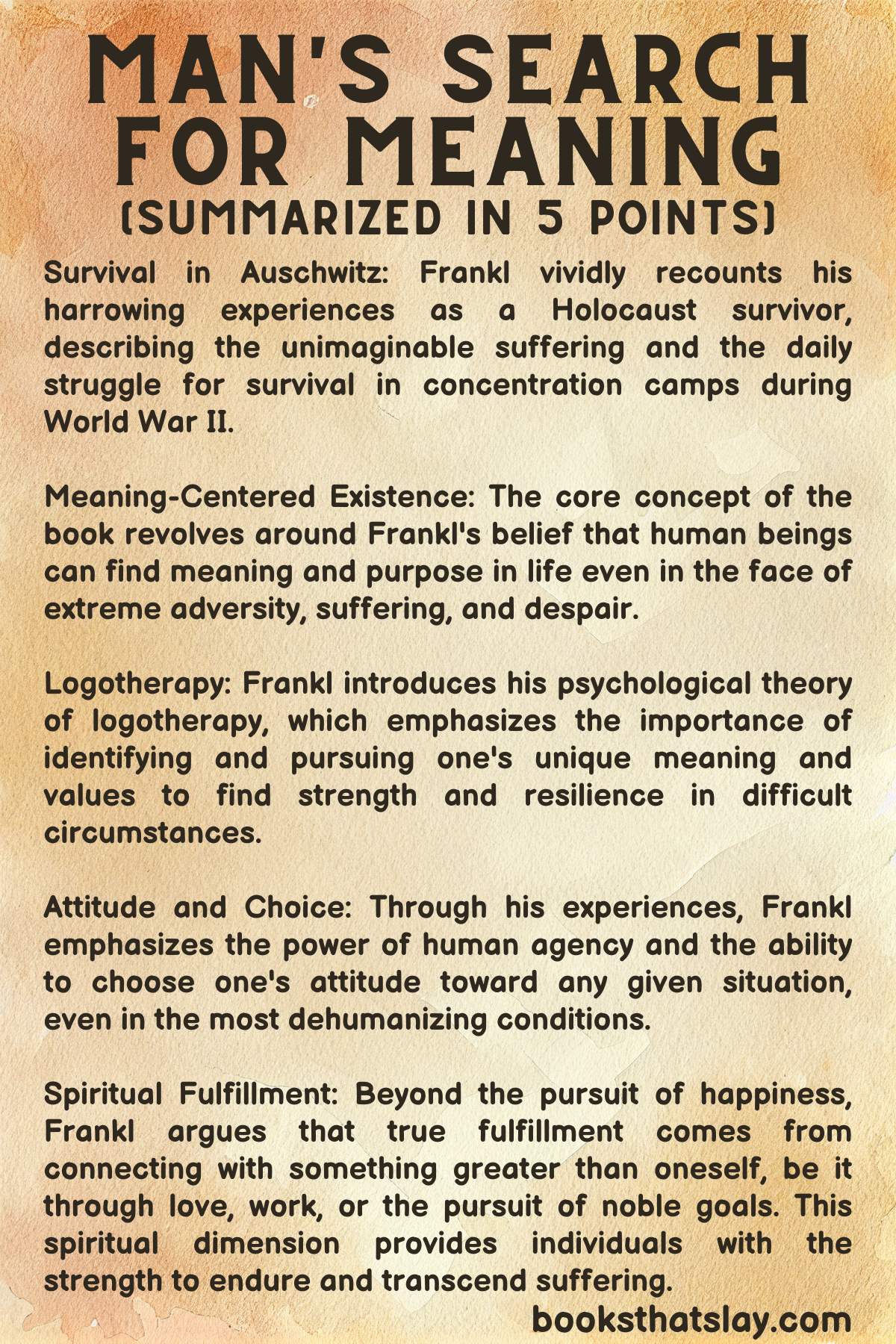Man’s Search For Meaning | Book Summary
“Man’s Search for Meaning” is a book written by Viktor E. Frankl, an Austrian psychiatrist who was a survivor of the Holocaust. The book, which was first published in 1946, combines elements of memoir, psychology, and philosophy, and it has been widely recognized as one of the most influential books of the 20th century.
Man’s Search for Meaning Summary
The book is divided into two parts.
Experiences in a Concentration Camp
The first part, “Experiences in a Concentration Camp,” provides an autobiographical account of Frankl’s harrowing experiences as a prisoner in Nazi concentration camps during World War II, specifically Auschwitz and Dachau.
In the first part, Frankl does not chronicle the Holocaust’s atrocities in a systematic or chronological order.
Instead, he aims to share the mental and emotional journey that he and his fellow prisoners went through. He details the initial shock upon arrival, the period of apathy and emotional deadening that allowed individuals to survive daily life in the camps, and the post-release psychological trauma and readjustment process.
Frankl maintains that, while he and the other prisoners were subjected to consistent physical and psychological torture, the Nazis could not take away a person’s spiritual freedom or their ability to choose their attitude towards their suffering.
Frankl points out instances where he and others found meaning in their suffering, and he argues that it was this ability to find meaning that often made the difference between life and death.
He even provides examples of humor, art, and nature providing a sense of hope and purpose amidst the dehumanizing conditions.
Logotherapy in a Nutshell
The second part, “Logotherapy in a Nutshell,” introduces and elaborates on Frankl’s psychotherapeutic method, Logotherapy, which he developed based on his experiences in the camps and something that can be used even in today’s time.
Logotherapy (from the Greek “logos,” meaning “reason” or “principle”) posits that a person’s primary motivational force is to find meaning in life.
This contrasts with Freud’s pleasure principle and Adler’s power principle.
Frankl proposes that individuals can discover this meaning through three different paths: creating a work or doing a deed, experiencing something or encountering someone, and by the attitude we take toward unavoidable suffering.
Frankl underscores that meaning is highly individual and unique, and it can vary over time.
It’s not a static, one-size-fits-all concept. Also, he emphasizes that the search for meaning is not an abstract philosophical exercise but a practical task that involves every person in their daily lives.
If a person cannot find this meaning, they may experience an existential vacuum, a state of emptiness and despair.
“Man’s Search for Meaning” concludes with the idea that life has potential meaning under any circumstances, even the most miserable ones.
Frankl argues that our main motivation for living is our will to find meaning in life, and that it’s this sense of purpose that enables us to overcome difficulties and make our lives worth living, no matter the circumstances.

Also Read: The Untethered Soul | Book Summary
What can you learn from the book?
1. Meaning Can be Found in Life Even in the Worst Circumstances
Throughout his horrifying experiences in Nazi concentration camps, Frankl consistently asserts that one can find a reason to live in any situation, no matter how bleak.
The very search for this meaning, Frankl posits, can provide a reason to continue living. For instance, Frankl often found his reason in the hope of seeing his wife again, or in his professional ambition to rewrite the manuscript that was taken away from him by the Nazis.
Thus, the book suggests that our ability to find or create meaning, even in the most brutal circumstances, can serve as a powerful source of motivation and resilience.
2. The Power of Choice and Personal Responsibility
Despite our lack of control over certain life events, we can always control our reactions to them.
Frankl emphasizes that the last of human freedoms is the ability to choose one’s attitude in any given set of circumstances.
He vividly illustrates this lesson with his experiences in the concentration camps, where despite the degrading and inhumane conditions, he was able to maintain a sense of dignity and inner peace by choosing his mental and emotional responses.
Also Read: Girl Wash Your Face | Book Summary
3. Suffering is Inherent to Life and Can Be Meaningful
Frankl argues that life is not primarily a quest for pleasure or power, but a quest for meaning.
This meaning can be found in three ways: through work (doing something significant), through love (caring for another person), and through courage during difficult times. Frankl suggests that suffering itself is a potential source of meaning if it is unavoidable.
His own experiences, such as enduring the hardships of life in a concentration camp, served to reinforce this belief.
The ability to find purpose in suffering can be a transformative experience, turning personal tragedy into triumph.
4. The Pursuit of Meaning Over Happiness
Frankl states that happiness cannot be pursued; it must ensue as the unintended side effect of one’s dedication to a cause greater than oneself or as the by-product of surrendering to someone else – in love.
Meaning, according to Frankl, is the true pursuit of life, not ephemeral pleasure or immediate gratification.
This perspective shifts the focus from self to others and from receiving to giving, offering a much more fulfilling and lasting form of contentment.
Final Thoughts
In summary, “Man’s Search for Meaning” is a profound book that combines historical memoir, philosophical discourse, and psychological insight to argue that finding meaning in life is a key element of human existence, capable of enabling us to endure even the most severe suffering.
Also Read: